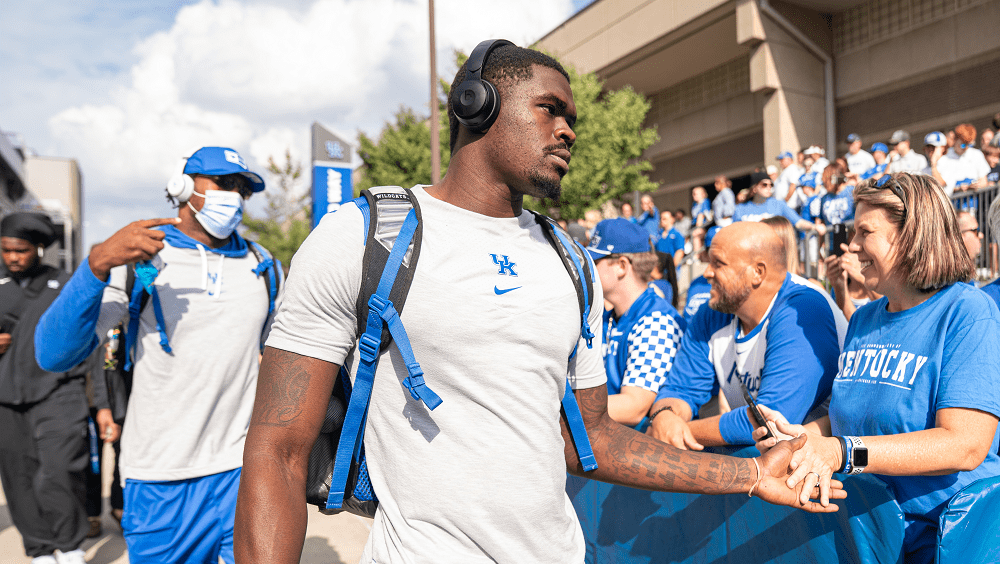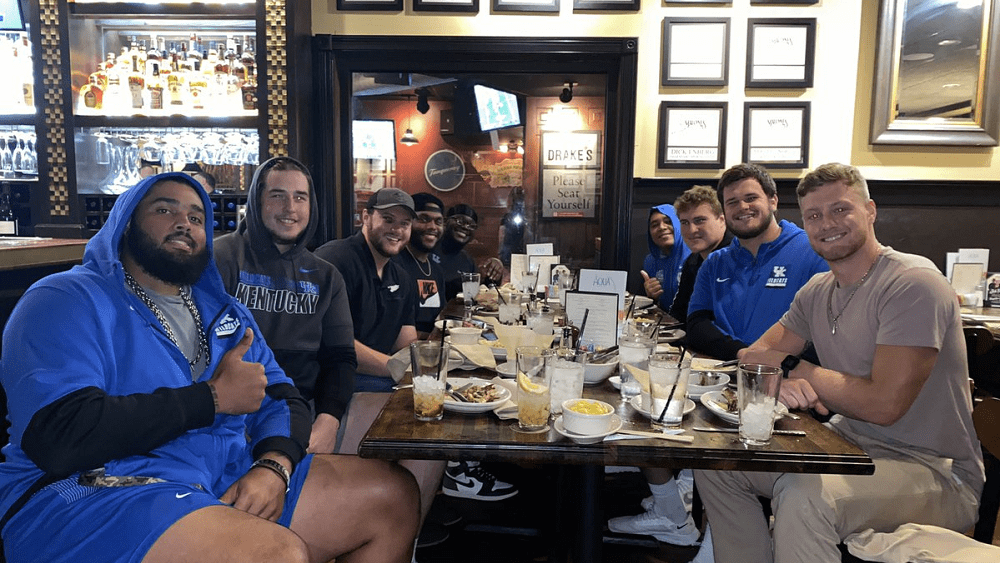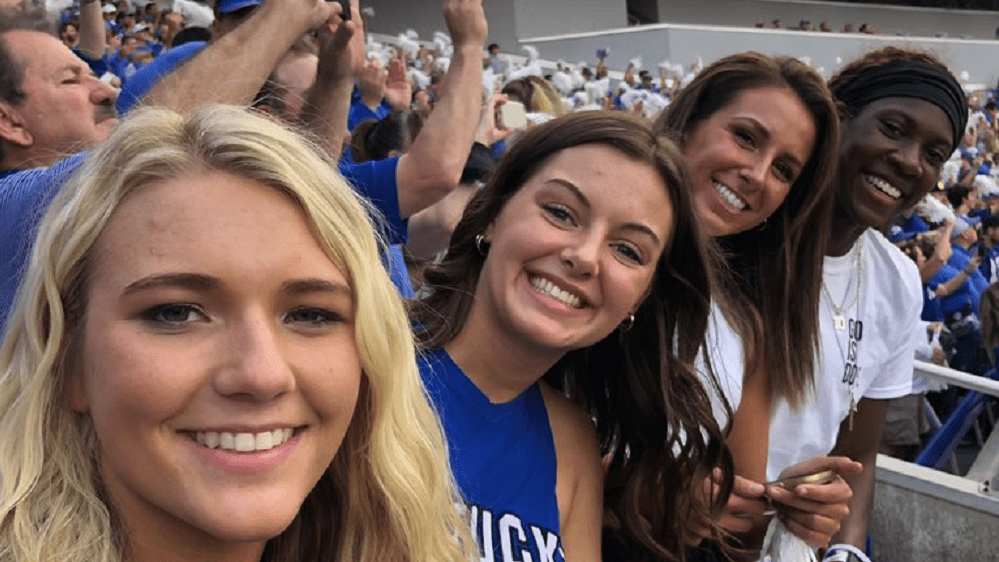
Keion Brooks could soon be one of the UK athletes looking for a way to make money off his name and likeness. (UK Athletics Photo)
Kentucky athletics director Mitch Barnhart’s approach to the changing name, image and likeness scenarios reminds me of how I reacted when I was first approached about social media. I really wanted no part of something that might change my job in ways I could not comprehend but had no choice to go along with it. Of course, now I am so happy I was forced to embrace social media and it certainly extended my sports career.
“It’s foreign territory for me,” Barnhart said Friday during a Zoom conference with media members about name, image, and likeness rights that college athletes will have beginning July l. “It’s not something that I enjoy and it’s not something that I take advantage of.
“But at the end of the day, I know that our young people may want that opportunity. If they do, then we have to figure out a way to help them understand what it means to assign their name and their likeness to (an endorsement), what that will look like and the expectations that go with that.”
May want that opportunity? Come on Mitch. Why would a student-athlete not want a chance to capitalize on his or her name and performance like universities have been doing for years?
Barnhart talked about taking “gentle steps” and being careful to “not rush into mistakes.” To me that says UK wants to keep controlling student-athletes as long as possible.
Gov. Andy Beshear issued an executive order allowing college athletes in Kentucky to start taking advantage of opportunities July 1. Barnhart is still hoping the NCAA will have some “new language” by then to guide schools.
“We’re in the early stages of putting all of those pieces together,” Barnhart said Friday. “I hope the journey is a long one.”
He knows not all endorsement deals will be equal for college athletes. That’s just a fact in the real world.
“There are opportunities out there for some folks that will probably be greater than others,” Barnhart said. “The challenge will be multiple. The focus, I hope for our young people, begins with their educational experience and they continue to want to be educated at an institution of higher learning.
“The second thing I hope, is that would want to maintain relationships and the reason they cam to an institution of higher learning especially at the Division I level to play college athletics and the Southeastern Conference. They have an opportunity to do a third thing, which is to monetize some of the things that come with their name, image, and likeness.”
Louisville athletics director Vince Tyra was more open (realistic) about changes coming. He has heard rumors of six-figure deals possible for some athletes. He’s more worried about the requirement that athletes must notify schools about the deals they are making.
“We have to have all those individual deals logged. And over time, we’ll learn what the quote-unquote fair-market value for some of these opportunities,” Tyra said. “U of L isn’t a party to any of these transactions. It’s going to be between a student-athlete and whoever that third party is.
“The reality is some of these opportunities can happen in real-time. Especially in social media, there could be an opportunity that comes to someone, and within a minute, they’ve just earned $100. Their awareness that they need to report that is critical. We’re realistic and recognize that some of (that reporting) is going to come on the back end.”
Tyra says the Louisville brand is “prevalent” in Louisville where there is a “pro-like feel” to college sports.
“One, we want to make sure that companies don’t cross ways with the values of the university,” Tyra said. “We just want to make sure that they are in line with university values.
“I can’t tell you right now whether I feel comfortable as to whether that car dealership may or may not be able to do what they want to do until I see what comes out of the NCAA guidelines.”
Barnhart wanted no part Friday of speculating what type of deals might be available to athletes or what they might be able to make. He said UK’s main priority will remain for athletes to be “life-long learners and to educate” even in this new era.
“There are a lot of hypotheticals,” Barnhart said. “We’re in the early stages of putting pieces together. We don’t want to rush into mistakes.”
But ready or not, change is here and just like I did with social media, Barnhart is going to have to accept that just like I did when the internet changed my world years ago.







12 Responses
I understand Barnhardt’s hesitancy. As administrator of the Athletic Department whatever goes wrong in that realm ends up on his doorstep. When a door swings open and 18-22 year-olds can suddenly get easy money for doing nothing more than attaching their name or likeness to any business, product, website — and as you point out, which of them wouldn’t want to cash in on the opportunity? — what could possibly go wrong there? You see it as a reluctance to relinquish control (and income), and I’m sure there’s some truth to that; but this new freedom also presents a minefield of potential conflicts. To take just one example, just how free will the kids who play at Kroger Field be to encourage fans to shop at Piggly Wiggly?
Big time, big money college athletics have been with us for a long time, inexorably shifting away from "amateur" status and closer to "professional." Recent changes permitting payment of an expense allowance to athletes, a kind of minimum wage, moved the needle even further. The transfer portal has opened up a kind of collegiate free agency. Now, the NIL ruling blurs yet another distinction. More and more the collegiate emphasis too becomes all about the money; thus players "opting out" of competition to protect their financial interests is becoming more common, and to most observers, more acceptable. Part of Mitch’s caution, I think, is also because he feels this shifting emphasis even more thanks to NIL, perhaps at the expense of other more traditional values associated with athletic competition.
Yes, like social media it seems to be the wave of the future, and I suppose we had better get used to it. I must admit, though, I share Mitch’s hesitancy. The more the college game becomes "just like the pro’s," the more it loses its uniqueness and becomes one more professional sport I, as a crusty old American, can easily ignore.
I think the whole idea is dead wrong. It is not fair to all athletes, and is not appropriate for college sports IMO. AD Barnhart is right in addressing very valid concerns about this. These pampered athletes are there to get a free education by playing a sport they love, not easy money. If they want big money over and above a free education, then they should look at options available for them to turn pro right out of high school and skip the college experience.
I agree with you Larry.
Great post Ron. Bottom line, though, is change is coming. Maybe you are right that Mitch just wants to be cautious but I also think he is not going to embrace it all
Great Post Ron. I already pass on watching Pro football on Sundays and Pro basketball any time. I could save some money if I would cancel my SEC channel on cable TV. I have already given up my pricey UK Football game tickets. If the game changes too much there will be no point in spending the money for something I won’t watch.
lead or be left behind.
College athletics will become more of a dog eat dog world than it already is. The rich will get richer and the poor will get poorer. Remember when freshmen couldn’t even play? How things change. I have to say I agree with pup on this one.
Leaders lead! This no issue to be hesitant about!
There is more to leadership than accepting the inevitable and jumping on the bandwagon, or following the style popularized by George Armstrong Custer and charging blindly into the unknown., though those are two popular opinions about how to lead. There are good reasons for prudence right now, reasons that have nothing to do with wanting to deny young men and women of limited means from earning a few extra bucks.
As for Mitch "not going to embrace it all," Larry, I hope he doesn’t, because all of it won’t be good. Hopefully his prudent leadership will help preserve much of what is still good about college athletics, at least at UK, accommodate the good things that can come from this newly mandated ruling, and eliminate many of its potential pitfalls as well. Reading his lack of enthusiasm as being a failure of leadership or a reluctance to support the interests of his own student athletes is, at best, shortsighted.
We will just each interpret our own way. What you have to remember is that players are going to have freedom whether Barnhart and/or UK likes it or not
OK.. It’s coming but! Just for sake of argument, if college athletes are going to get paid for playing football and using UK (or any university) as a way to make money while he plays football there, why are the tax payers having to fund his scholarship? He’s making money on the UK name, let him pay his own tuition, room and board.
Actually, taxpayers don’t fund the scholarships. UK Athletics operates on its own